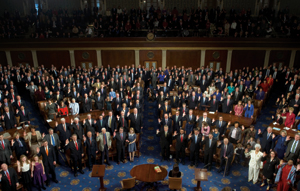CQ WEEKLY – VANTAGE POINT
Jan. 5, 2013 – 11:01 a.m.
Welcome to the 113th Congress
By Alan K. Ota, CQ Staff
A seamless transition to the 113th Congress left even the most experienced lawmakers a bit dazed after protracted fiscal fights kept the postelection session of the old Congress going even as the newcomers gathered at the doors.
But veterans and freshmen quickly faced up to a fast-approaching series of new challenges: a limit on the national debt that will run out near the end of February, automatic spending cuts that take effect March 1 and a spending bill that expires March 27.

|
OPEN FOR BUSINESS: The new House swears to be different, and some members’ children are witnesses. (CHRIS MADDALONI/CQ ROLL CALL)
|
|
|
“It’s not a good thing, but it’s necessary,” said Rep.
John D. Dingell
, a Michigan Democrat and dean of the House, referring to the absence of any recess between the old Congress and the new one. Dingell, who first came to Capitol Hill in December 1955, said he could remember only one other endless Congress, in early 1971 under President Richard Nixon.
For their part, rank-and-file members, including Democratic Reps.
Henry Cuellar
of Texas and
Lee Terry
of Nebraska, said they looked forward to a district work period the week of Jan. 7, before the onset of new legislative battles.
“There’s no end to it. It feels like it’s going to be four years in a row,” said Cuellar, a Democrat.
“None of us are really pleased with the way the 112th ended,” said Terry, a Republican. “We’re all family, but sometimes you just need a little time apart.”
House Speaker
John A. Boehner
of Ohio won re-election on the first day of the new Congress with 220 Republican votes out of a caucus of 233. There are 200 Democrats in the new Congress, with two vacancies.
Nine Republicans voted for someone else for speaker, including three who named his rival, Majority Leader
Eric Cantor
of Virginia, in a protest against the fiscal cliff agreement. “I’m saying, ‘Let’s wake up and change direction,’” said one of them,
Steve Pearce
of New Mexico. “We’re doing nothing to solve the problems.” Other dissidents cast votes for Rep.
Jim Jordan
of Ohio, Rep. Raúl R. Labrador of Idaho, former Rep. Allen B. West of Florida and David M. Walker, the former U.S. comptroller general.
On the Senate side, Majority Leader
Harry Reid
of Nevada, a Democrat, used a subtle maneuver to keep the first legislative day of the new Congress open until Jan. 22, the day after President
Barack Obama
’s inauguration. That was designed to keep alive the possibility of using a simple 51-vote majority to adopt procedural changes — in lieu of seeking a formal change in the standing rules of the Senate, which would require 67 votes. Democrats
Jeff Merkley of Oregon and
Tom Udall
of New Mexico have been pushing to reduce opportunities for filibusters that block floor action. Republicans mightily resist unilateral changes, and in the interval, Reid will negotiate with Minority Leader
Mitch McConnell
of Kentucky to find a compromise involving voluntary actions.
Boehner moved to tamp down anger from the New Jersey and New York delegations over his decision in the final hours of the last Congress not to have a vote on a $60.4 billion disaster aid bill for victims of Superstorm Sandy. On Jan. 4, the new House passed and the Senate cleared a $9.7 billion infusion for the flood insurance program. House leaders promised to vote on further aid on Jan. 15.
One important item of business went off without a hitch for the new Congress: the official counting of electoral votes. Obama won 332 votes to GOP challenger Mitt Romney’s 206, with no “faithless electors” or split state votes changing the Nov. 6 results.
